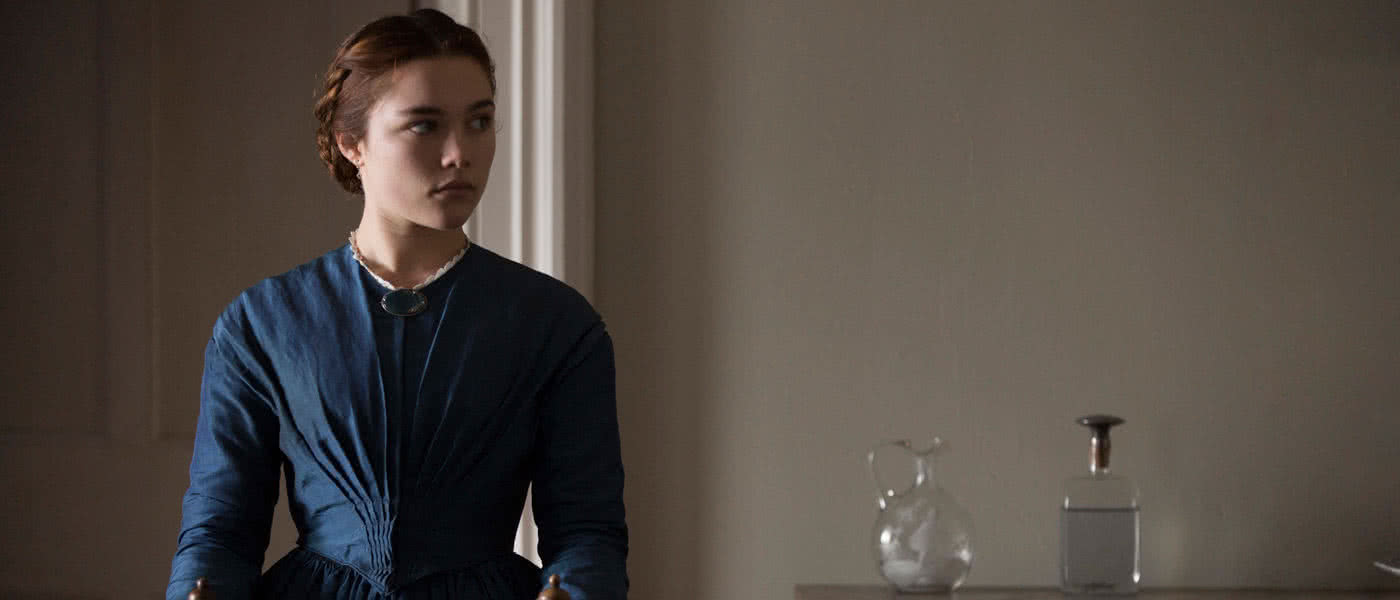Lady Macbeth ‘deserves no sympathy for its calculated exploitation fantasy’ says MacDara Conroy
Lady Macbeth is a difficult film to like. That’s not to say it’s a difficult one to appreciate. In his debut feature, director William Oldroyd betrays his theatre background with many static shots of rooms, often entirely absent of soundtrack, where figures buttoned in starched collars or trussed in whalebone sit in silence; stage-minded set-ups that nevertheless work exceptionally well with the coldness of the material, an adaptation (by Alice Birch) of Nikolai Leskov’s 19th-century novel Lady Macbeth of the Mtsensk District.
This is the work of a confident filmmaker, no doubt. The period formality, which grows increasingly arch as the mood heightens, nods to Peter Greenaway. Deftly handled by cinematographer Ari Wegner, the visual palette throughout is muted by a pall of grey to match the grim environment, both geographic and cultural, for this is Victorian England on the Yorkshire moors — a pitiful time and place for anyone to eke out an existence, let alone a woman.
The woman in question here is Katherine (Florence Pugh), married off – or rather, sold off – at the very start to a frustrated, impotent husband (Paul Hilton) and, by extension, his wretched, demanding father (Christopher Fairbank). Katherine is virtually imprisoned in their drafty manor, her days a drudge of corsets, boredom and exhaustion at the behest of her masters. The viewer is under no illusions as to the anti-patriarchal themes at play.
Then husband and father-in-law are called away separately on business matters, and Katherine is left to her own devices. Relishing her freedom, she dresses as her maid Anna (Naomi Ackie) and ‘takes the air’, exploring the misty, windswept moors. She’s most at home in this evocative environment, ruggedly beautiful yet cold and unforgiving; a metaphor for her underlying character, as it turns out.
Freedom leads to temptation, and Katherine soon crosses paths with a newcomer to the estate, Sebastian (Cosmo Jarvis), a gruff stablehand with a penchant for sexual sadism. A first encounter leaves Katherine embarrassed but exhilarated. Sebastian takes notice and pushes his luck, committing a sexual assault that becomes a seductive tryst — at which point the story, like The Scottish Play its title echoes, becomes a succession of increasingly outrageous acts of intrigue, mortal sin and moral degradation.

That would all be well and good; transgressive cinema has value, when it has a point. But Lady Macbeth is confused about its messages. We’re for instance supposed to take Katherine’s relationship with Sebastian as an expression of her agency, when it’s really the hackneyed PUA cliché of the girl who says no but means yes. This Sebastian is a curious one, indeed: Jarvis plays him with a palpably malevolent air, until he suddenly flips and sprouts a conscience in an overwrought reading of the lady from Shakespeare’s tragedy.
The film notably presents people of colour as just part of the landscape, not specifically singled out for their difference. It’s a refreshingly different view of period England, that Anna is a maid like any other in the house. Except when she isn’t — when she’s strung up like a pig in a blanket by Sebastian in the stables, or ordered to crawl on the dining room floor by Katherine’s father-in-law, to the lady’s undeniable amusement.
These depictions of misogyny and racism pay mere lip service to social commentary, an excuse to be emptily provocative. Look, the filmmaker says, I made my main protagonist submit to her rapist and enjoy the experience. See here, I made a black woman crawl on her hands and knees while a man derides her as an animal. When tallied up, the only thing they say about our Lady Macbeth that she’s a bad seed. Where’s the character development in that?
That’s not to take away from Pugh, however. The anchor of practically every scene, she’s burdened with a disproportionate share of the work and pulls it off with an aplomb that belies her youth and inexperience. It’s a star-making performance.
Yet here she is in a film that she may come to regret. Lady Macbeth should get no pass for its artsy pretensions, when the uncomfortably similar depiction of eroticised rape in Sam Peckinpah’s Straw Dogs does not (and rightly so). It will probably be embraced absent the controversy courted by the likes of Paul Verhoeven’s Elle (and its precursor, Abel Ferrara’s Ms 45) despite their subjects having arguably more agency over their fate, albeit complicated.
A more appropriate comparison would be Takashi Miike’s Audition, often read as a feminist text, whose female lead is as much a product of patriarchal chauvinism and the male gaze as she is a cold-blooded reactionary who ultimately deserves no sympathy for her calculated violence. Likewise, this film deserves no sympathy for its calculated exploitation fantasy.
Lady Macbeth opens at selected cinemas on Friday April 28th with special Q&A screenings at Cineworld Dublin, IMC Dun Laoghaire and Omniplex Cork on Thursday April 27th
[amazon_link asins=’B073BW41RX’ template=’ProductAd’ store=’thumpedcomwp-21′ marketplace=’UK’ link_id=’3e2fee9d-668d-11e7-b1f5-4b446fcaf84b’]


